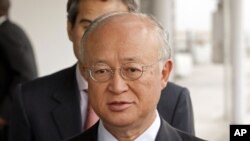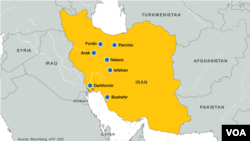A senior Iranian official and the United Nations nuclear affairs chief say they made progress in talks in Tehran Monday, as they laid the groundwork for nuclear negotiations between Iran and major world powers on Wednesday.
Iranian media quote the director of the International Atomic Energy Agency, Yukiya Amano, as saying the meeting was “intensive” and “very useful,” and would definitely “have a positive impact on” Wednesday’s talks.
But he also reportedly hinted at continuing disagreements, saying Iran and his agency each have their own views on the details of a framework to resolve the dispute over Iran’s nuclear program.
Iran says its nuclear program is for peaceful purposes, but Western officials and experts suspect it is aimed at developing the ability to build a nuclear weapon. The IAEA chief apparently did not get Iranian approval for inspections of key nuclear facilities.
It was Amano's first trip to Iran since taking office at the U.N. nuclear agency in 2009.
After the talks, the top Iranian nuclear negotiator, Saeed Jalili, said he had a good discussion with Amano about how to cooperate on global nuclear disarmament, stopping the spread of nuclear weapons and supporting the rights of IAEA member states.
Jalili made the comments standing alongside Amano at a joint news conference broadcast on Iranian state television. He called the talks “very good” and expressed the hope for “good cooperation in the future.”
Before leaving Vienna, Amano said he hoped to build on "good progress" made by lower-level IAEA and Iranian officials in the Austrian capital last week. But Amano also said "nothing is certain" about the prospects for an agreement on nuclear inspections.
Iran has rejected repeated IAEA requests to inspect its Parchin military complex in response to Western allegations of atomic weapons research at the site. Tehran says the complex houses only conventional weapons and insists the Iranian nuclear program is peaceful.
Tehran Weighs Options
Proliferation expert Mark Fitzpatrick at London’s International Institute for International Studies says Iran probably already has the capability to build a nuclear weapon. But he says economic sanctions may have given Iranian leaders enough incentive to take steps to reassure the international community that they won’t.
“Iran feels under great pressure on the sanctions front," Fitzpatrick said. "It sees that this pressure is only going to increase unless it takes some steps. So I think it has made a decision to try to do something to relieve the pressure, whether enough to bring about any reduction in sanctions, that’s where I have some doubt.”
Wednesday’s meeting will bring Iranian officials together in Baghdad with senior representatives of the permanent five United Nations Security Council members and Germany.
Fitzpatrick says the international officials will be looking for concrete steps by Iran to ensure that it cannot quickly build a nuclear weapon. Such steps could include removing from the country highly enriched uranium and the centrifuges that make it.
Fitzpatrick says such moves would be in keeping with official Iranian policy declarations, but he is not sure the country’s leaders are ready to agree to them this week.
“There’s a lot of positive ‘mood music’ surrounding the Baghdad meeting," he said. "But I fear that the expectations might have risen too high, because I think what Iran will be seeking and what it is willing to give at this stage, those two may not yet meet.”
Fitzpatrick says the improved negotiating atmosphere and the prospect for some progress have eased pressure for an immediate military strike on Iran’s nuclear facilities.
Israel Wary
But in Israel, where the prospect of a military strike is hotly debated, Defense Minister Ehud Barak warned Monday that Iran would try to “create an appearance of progress” in order to relieve international pressure.
Israel sees a nuclear-armed Iran as a threat to its existence and refuses to rule out military action against the Iranian nuclear program.
During a visit to Prague Friday, Israeli Prime Minister Benjamin Netanyahu expressed concern about the Baghdad talks, saying Iran may use them to buy time to advance its weapons ambitions.
Western officials say they will only be satisfied by concrete actions. The United States also has refused to rule out a strike on Iran to prevent it from obtaining nuclear weapons.
VOA's Michael Lipin in Washington contributed to this report.
Iranian media quote the director of the International Atomic Energy Agency, Yukiya Amano, as saying the meeting was “intensive” and “very useful,” and would definitely “have a positive impact on” Wednesday’s talks.
But he also reportedly hinted at continuing disagreements, saying Iran and his agency each have their own views on the details of a framework to resolve the dispute over Iran’s nuclear program.
Iran says its nuclear program is for peaceful purposes, but Western officials and experts suspect it is aimed at developing the ability to build a nuclear weapon. The IAEA chief apparently did not get Iranian approval for inspections of key nuclear facilities.
It was Amano's first trip to Iran since taking office at the U.N. nuclear agency in 2009.
After the talks, the top Iranian nuclear negotiator, Saeed Jalili, said he had a good discussion with Amano about how to cooperate on global nuclear disarmament, stopping the spread of nuclear weapons and supporting the rights of IAEA member states.
Jalili made the comments standing alongside Amano at a joint news conference broadcast on Iranian state television. He called the talks “very good” and expressed the hope for “good cooperation in the future.”
Before leaving Vienna, Amano said he hoped to build on "good progress" made by lower-level IAEA and Iranian officials in the Austrian capital last week. But Amano also said "nothing is certain" about the prospects for an agreement on nuclear inspections.
Iran has rejected repeated IAEA requests to inspect its Parchin military complex in response to Western allegations of atomic weapons research at the site. Tehran says the complex houses only conventional weapons and insists the Iranian nuclear program is peaceful.
Tehran Weighs Options
Proliferation expert Mark Fitzpatrick at London’s International Institute for International Studies says Iran probably already has the capability to build a nuclear weapon. But he says economic sanctions may have given Iranian leaders enough incentive to take steps to reassure the international community that they won’t.
“Iran feels under great pressure on the sanctions front," Fitzpatrick said. "It sees that this pressure is only going to increase unless it takes some steps. So I think it has made a decision to try to do something to relieve the pressure, whether enough to bring about any reduction in sanctions, that’s where I have some doubt.”
Wednesday’s meeting will bring Iranian officials together in Baghdad with senior representatives of the permanent five United Nations Security Council members and Germany.
Fitzpatrick says the international officials will be looking for concrete steps by Iran to ensure that it cannot quickly build a nuclear weapon. Such steps could include removing from the country highly enriched uranium and the centrifuges that make it.
Fitzpatrick says such moves would be in keeping with official Iranian policy declarations, but he is not sure the country’s leaders are ready to agree to them this week.
“There’s a lot of positive ‘mood music’ surrounding the Baghdad meeting," he said. "But I fear that the expectations might have risen too high, because I think what Iran will be seeking and what it is willing to give at this stage, those two may not yet meet.”
Fitzpatrick says the improved negotiating atmosphere and the prospect for some progress have eased pressure for an immediate military strike on Iran’s nuclear facilities.
Israel Wary
But in Israel, where the prospect of a military strike is hotly debated, Defense Minister Ehud Barak warned Monday that Iran would try to “create an appearance of progress” in order to relieve international pressure.
Israel sees a nuclear-armed Iran as a threat to its existence and refuses to rule out military action against the Iranian nuclear program.
During a visit to Prague Friday, Israeli Prime Minister Benjamin Netanyahu expressed concern about the Baghdad talks, saying Iran may use them to buy time to advance its weapons ambitions.
Western officials say they will only be satisfied by concrete actions. The United States also has refused to rule out a strike on Iran to prevent it from obtaining nuclear weapons.
VOA's Michael Lipin in Washington contributed to this report.
|
Join the conversation on our social journalism site - Middle East Voices. Follow our Middle East reports on Twitter and discuss them on our Facebook page. |





